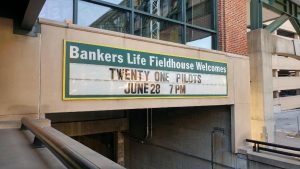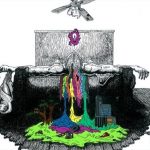7 Twenty One Pilots and the Art of Interpretation
I can’t even remember the first time I was introduced to Twenty One Pilots. It feels like I’ve known about them forever, but I do know that it was my best friend who shared them with me. From the moment I listened to that first song, I was hooked. But it wasn’t until years later that I got to see them in person on June 28, 2019. Since I’m writing this on June 9th, the anniversary is coming up. Though I would have liked to see them in concert sooner, I’m almost glad that I didn’t get the chance until 2019. By then I had all their songs, new and old, memorized and had a more personal connection to them than I would have even a few years ago.
Twenty One Pilots. It feels like I’ve known about them forever, but I do know that it was my best friend who shared them with me. From the moment I listened to that first song, I was hooked. But it wasn’t until years later that I got to see them in person on June 28, 2019. Since I’m writing this on June 9th, the anniversary is coming up. Though I would have liked to see them in concert sooner, I’m almost glad that I didn’t get the chance until 2019. By then I had all their songs, new and old, memorized and had a more personal connection to them than I would have even a few years ago.

I’ve been to quite a few concerts. Not as much as others, but not as few as some. A good amount, I think. Enough to compare and contrast the way the concerts were set up and how they made me feel. That’s why I’ll never forget that Twenty One Pilots concert, because it was unlike any of the other concerts I’ve been to. There are so many moments I could recount that took my breath away. When Tyler was on stage, the lights went out and everyone realized it had been a double on stage and he was suddenly standing on the balcony right over our heads singing one of my favorite songs, Fairly Local. Or before we even got to the concert when we were driving through the city to get to Banker’s Life Fieldhouse. There were swarms of people walking the sidewalks heading for the concert all swathed in yellow and black. They had assortments of yellow shirts, yellow duct tape (a symbol from the Trench album), there were even cars we passed parked with the yellow symbol of Twenty One Pilots painted on the sides and windows. But I think the moment I’ll always remember was at the end when yellow confetti rained down on the whole stadium as they sang Trees. I just remember looking around and being overcome with this indescribable feeling of just realizing that everyone in this giant stadium was there for the same reasons as me. That these songs had touched them and meant something to them like they did to me. I’d never experienced anything like that at any other concert I’d been to. There were people of all different kinds, from all different walks of life who had come from all over just to see this band. Just like me. It was a unifying atmosphere.
That’s why I’m writing this chapter on Twenty One Pilots. They’re a unifying band. They appeal to every generation, every type of person from every season of life. They’re songs mean different things to different people. My goal in writing this chapter is to see if I’m right in how interpretative and flexible their songs are, that they’re songs can mean wildly different things to different kinds of people. I’m a firm believer that music is a form of art. And art, no matter what type, once it is put into the world belongs not just the artist but to the viewers, the listeners, the readers, the consumers. One of the best pieces of encouragement or advice given to authors by fellow authors is that the books is not just theirs. Once an author publishes a book, that book no longer belongs to them and them alone. The book becomes one part, the author’s and one part the reader’s. In that sense, music is the same. Once a song is out in the world, it’s not just the songwriter/singer’s anymore, it belongs to the people too and because of that, music is deeply personal and interpretative.

A song can move a person to tears, bring someone intense comfort and relief, make people feel less alone and seen like nothing else. Music and songs speak to people in a way that a lot of other art forms can’t. Even Sontag, who’s essay Against Interpretation mentioned Artiste’s idea of art and how “lie or no, art has a certain value according to Aristotle because it is a form of therapy. Art is useful, after all, Aristotle counters, medicinally useful in that it arouses and purges dangerous emotions.” Music can help people process upsetting emotions that could morph into something more dangerous. Loneliness, pain and anger can lead to people to act upon them in dangerous and drastic ways. There are some people who have angry playlists or sad playlists. They listen to them when they feel those particular emotions. It helps them sit in those emotions, feel understood and purge and process them through the lyrics and sound of the songs.
In Kim Cooper’s track by track review of In the Aeroplane Over the Sea by Neutral Milk Hotel, she begins by explaining why and what she’s writing about. Near the end of her introduction paragraph, she says, “If you love Neutral Milk Hotel, then these songs mean something particular to you, and no writer’s ruminations can negate that meaning.” Cooper knows the importance that a song can have in a person’s life, how a single person can “own” a song that wasn’t written or sang by them. She wants to make it clear that her interpretation and her interviews of the band members themselves actually explaining what the songs mean, won’t ruin a fan’s love and personal experience with a song. Cooper ends her paragraph by saying think of “the album as the primary text and your reaction to it the secondary one.” In Against Interpretation, Sontag has a different point of view. She very much favors the primary text, the original content of the work of art. Sontag believes that in modern times “the project of interpretation is largely reactionary, stifling. Like the fumes of the automobile and of heavy industry which befoul the urban atmosphere, the effusion of interpretation of art today poisons our sensibilities.”
Kim Cooper talks about a balance between the primary text and our personal reactions to that text whereas Sontag blatantly says that reactions to the text is the thing that is ruining art when really, our reactions are what makes it art. How a song makes us feel, the events and experiences and personal issues that they recall to our minds is what makes songs beautiful and artistic and valuable to us. If songs did nothing for us, didn’t provide any sort of entertainment or provoke any thoughts or emotions, why would we care about music at all? That’s part of why I’m writing this chapter. To prove the importance of interpretation, that songs are art in that listening to a song is a personal and meaningful experience different to individual people.
“Taxi Cab”

The first song I’d like to talk about is “Taxi Cab.” I interviewed a friend of mine who’s a huge fan of Twenty One Pilots and asked him what his interpretation of his favorite song was. His favorite song of theirs is “Taxi Cab.” As a Christian, he sees the song as talking about Christ’s forgiveness and how His forgiveness can resurrect Christians into new life. It’s a song full of hope, of wanting so much to live and be free of whatever is weighing on us, attacking us. To him it talks of being so tired and worn down by the world and yet completely forgiven by Jesus and never giving up that hope and grace found in Him. The whole song has a lot of imagery about death and a funeral procession and being raised to life from that death.
So the hearse ran out of gas
A passenger purse and grabbed a map
And the driver inside it contrived a new route to save the past
And checked his watch and grabbed a cab
A beautifully planned taxi cab
A cab, had it cleared out back
And two men started to unpack
(Twenty One Pilots, 2009, 2:55)
My friend goes on to say that he thinks the idea of being locked in the coffin and being driven away is meant to resemble that on our way through life we are without life – or Jesus – and without that life or Jesus within us, we feel shame, guilt, fear, hate and all the negative emotions that drags us down. But then when the song talks about scratch marks “where my fingernails had fought” (Twenty One Pilots, 3:28) that resembles that we have a deep desire to live. We don’t want to die, either physically or spiritually and we will fight with everything we have to stay alive even if the world acts as if we don’t matter.
Then I cracked open my box
Someone must have picked the lock
A little light revealed the spot
Where my fingernails had fought
Then I pushed it open more,
Pushing up against the door
Then I sat up off the floor
And found the breath I was searching for
(Twenty One Pilots, 2009, 3:23)
When the song goes on to say “I sat up off the floor and found the breath I was searching for” (Twenty One Pilots, 3:36) it’s talking about being found by Jesus and His grace. My friend went on to say that the best line is when it says, “where all your blood is washed away and all you did will be undone!” (Twenty One Pilots, 3:49) is talking about Jesus dying for us and that’s the place that these taxi drivers are taking this person, is toward Jesus, toward the “morning sun” (Twenty One Pilots, 3:45).
“My Blood”
When I asked my mom the same questions about her favorite Twenty One Pilots song, I got a very different answer, yet one that is equally as beautiful and important as the one from my friend. As a mother to an adult son with high functioning autism, she has a unique perspective of “My Blood.” To her it’s an anthem song to parents with special needs kids, a song about the community that brings together parents from all walks of life who have the same experiences in terms of raising children with special needs.
When everyone you thought you knew
Deserts your fight, I’ll go with you
You’re facin’ down a dark hall
I’ll grab my light
And go with you, I’ll go with you
(Twenty One Pilots, 2019, 0:14)

She explained that these verses of the song remind her of how it feels when you’re told your child has special needs and all your friends with neurotypical children fall away or abandon you. On the journey of life that is being a parent to a special need’s child, there are, unfortunately, a lot of people who don’t understand. It takes a special kind of friend to stick with you through the good, the bad and the ugly because being a parent to a kid with high functioning autism isn’t all sunshine and rainbows. There are immensely hard days. People will desert your fight, but then there are those who will rise up and go with you. That is the special needs community.
Another line from the song that speaks to this that my mom mentioned was “stay with me/you don’t need to run/my blood” (Twenty One Pilots, 1:15). To her these lines represent when parents of special needs kids become more than just friends – they become one blood. They become like family. These parents rally together in a really amazing way. They are each other’s support systems. They cry together, they vent to each other, they laugh and smile together at the good days and they struggle together during the hard days.
If you find yourself in a lion’s den
I’ll jump right in and pull the pin.
(Twenty One Pilots, 2019, 2:33)
This is one that I’ve seen time and again when my special needs brother was in school. It was really cool hearing how this song spoke to my mom and reminded her of certain experiences she’s had as a parent to a special needs kid. These verses reminded her of the many IEP meetings she had to go into and often she brought help to come alongside her. As the parent, you have to fight tooth and nail to get everything you want for your child. Some school districts can be great and helpful, but most of them don’t want to provide the services your child needs. Walking into that IEP meeting is like finding yourself in a lion’s den. Everyone is against you. This verse is the advocate/friend that comes alongside you and walks into that IEP meeting with you and fights with you, helps to get the services for your child. For us, that was my brother’s behavioral therapist. She was there every time, and helped my mom every time she had to go into one of those meetings to get my brother the help and services he needed to thrive in a school environment.
“Migraine”

My favorite Twenty One Pilots song is “Migraine.” The song “Migraine” from their Vessel album is much less subtle and more obvious in terms of what they’re talking about. It’s about mental illness, particularly living with anxiety and depression. The song starts out rather dismal. Talking about feeling alone, about “waging my wars behind my face and above my throat” (Twenty One Pilots, 0:06) and about suicide. It paints a real picture of what having anxiety, and depression looks like. It’s ugly and painful, and it can make living hard. Tyler Joseph isn’t afraid to talk about the truth and not trying to side step the hard parts and go straight to the encouragement. This song made me feel seen, made me feel less alone in the fact that I’ve had wars waging behind my face and above my throat for a long time. I’ve heard the “shadows screaming that I’m alone” (Twenty One Pilots, 0:11). He gets it. He understands what it’s like to live with mental illness and to go day in and day out feeling this way. My favorite part of the whole song is when he uses one metaphor after another to describe and paint a “mental picture portrait” of what it looks like inside the head of someone with anxiety and depression.
I am not as fine as I seem
Pardon, me for yelling and telling you green gardens
Are not what’s growing in my psyche, it’s a different me
A difficult beast feasting on burnt down trees
(Twenty One Pilots, 2012, 1:45)
But, like most people with mental illness know, it’s not good to sit in that pain and the hardness for too long. Nothing good comes from dwelling and this song knows that too. During my hardest moments, this song has made me feel seen, made me feel less alone, but most importantly, given me immense encouragement. The first half of the song is raw and honest and relatable. But then half way through, Tyler Joseph switches things up and reveals a silver lining. There’s hope woven throughout every one of their songs and this one is no different. He repeats the lines that the song starts out with, but instead of then shooting into having a migraine, depressive thoughts, suicidal Sundays, he ends with a “but I know, we’ve made it this far, kid” (Twenty One Pilots, 1:32). That line right there is what makes this song an anthem and an encouragement. He’s reminding all of those listening that if you’ve made it this far then you can make it a little further. The song ends with him repeating “made it this far” (Twenty One Pilots, 3:42). “Migraine” acknowledges the pain of mental illness while also reminding those having a hard time that they’ve made this far and they can keep going, there is always a way to keep going even if it’s just one step at a time.
Results
Since the first time I discovered this band I’ve always been fascinated their lyrics and the way their songs were written. It was one of the first bands I’d ever encountered that spoke to and appealed to all kinds of people. Twenty One Pilots had never seemed like the sort of band that pandered to one specific crowd. Their goal was to not reach a certain kind of people who shared the same ideologies, religions, or social status, but to reach people of all walks of life who struggle, stress and have issues. That happens to be every person on the planet. Everyone’s got problems. Everyone struggles. Everyone has stress. Some worse than others, but we’re all bonded by the fact that we all have hearts and we all have struggles. They could sing one song, and each person interprets it in a different way. Yet because of the nature of their songs, which touches on everything from the pressure and stress of growing up (“Stressed Out”) to from deep mental wounds and pain (“Friend, Please” and “Migraine”), each person relates the songs to very personal and emotional experiences in their lives.
I thought that each person’s interpretations of the songs would be wholly different from one another and from the surface, they kind of are. One is about a song in relation to their faith, one is about being a parent to a special needs kid and another is about mental illness. But all have one thing in common: they all related the particular song they chose to personal and emotional experiences in their lives. This little “experiment” has made me realize how Twenty One Pilots does something that many other bands can’t do or can’t do as well: they appeal to every kind of person because their songs talk about the human experience. About pain, loneliness, growing up, mental illness, fear, hope, love, pushing onward. These are all universal and they are all unifying. What they talk about in their songs make them relevant not just yesterday, or today, but tomorrow too because no matter what, people are going to still need to hear about hope and love. People are still going to feel lonely or afraid or the difficulty of growing up. Tyler and Josh don’t just skim the surface; they dive deep and that allows people to connect their favorite songs to experiences and issues in their lives, which then makes those songs extremely personal and meaningful to them on an individual level.
These three songs and reviews of the songs are perfect examples of why music is art and why interpretation is as important as knowing the true meaning to a song. Without allowing interpretation, art and music wouldn’t be able to touch people so deeply, wouldn’t be a personal experience. Everyone has a unique perspective; no two people’s lives and thoughts and experiences are the same and therefore, unless the song is blatantly obvious in what they’re talking about, no two people are going to come away listening to the same song with the exact same conclusion. Even if they do though, if you ask what the song made them think of, what it made them feel, there would be two different answers to that same question about the same song. Like all other forms of art, music is meant to be an experience. Not just consumed or enjoyed, but meant to speak to a person’s heart, elicit certain emotions within people and to provide a soundtrack for a person’s life. An experience is listening to a particular song and feeling seen, feeling supported, less alone, being given hope through the sound of a few instruments and words strung together into rhyme.
References:
Joseph, Tyler. (2009). “Taxi Cab.” On Twenty One Pilots. Fueled by Ramon.
Joseph, Tyler. (2019). “My Blood.” On Trench. Fueled by Ramon, Elektra Records.
Joseph, Tyler. (2012). “Migraine.” On Vessel. Fueled by Ramon.
Sontag, S. (1966). Against Interpretation . In Against Interpretation and Other Essays (pp. 3–14). Farrar Straus Giroux.
Cooper, K. (2015). Chapter 3, In the Aeroplane Over the Sea. In How to Write About Music (pp. 67–72). New York City, New York: Bloomsbury Academic.
